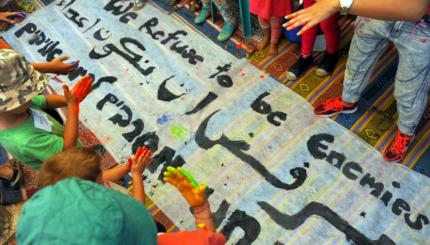I hesitated before asking my wife if she wanted to go out to dinner. We would not have to drive too far. There are a handful of good restaurants just a five-minute drive from home. But they are all outside the gates of Alon Shvut, and these days we are a bit afraid of going out there, especially at night. Over the last few weeks there have been at least four or five stabbing attacks at the Gush Etzion junction where two of the eateries are located. Driving in the direction of the other restaurants is not that much safer — there have been two recent stabbings there, not to mention the kidnapping and brutal murder of the three boys 15 months ago.
We stayed home.
Palestinians are also very much afraid. Of being held up for hours at roadblocks. Of aggressive and abusive soldiers at checkpoints. Of lynching by violent Jewish vigilantes. Of being shot dead, mistaken for a bloodthirsty terrorist.
Once almost two years ago, when for the first time in my life I met a Palestinian as an equal, Jamal tried to explain to me how his kids would begin to cry upon seeing a settler like me, with a large kippah and a long beard, and sometimes carrying an Uzi or with a pistol tucked into his belt. “Hanan”, he said, “we are all afraid of you.” Incredulous, I retorted – “No Jamal, we are all afraid of you!”
Yes, we are all afraid of each other, but what makes it even worse is that we are only aware of our own fears. We have no idea that they are as afraid of us as we are of them. We all live in our own bubble, oblivious to the fears of the “other” and of how that fear robs them of their joy, controls them and dictates their behavior just as ours does to us.
But even worse, we are blithely unaware of what we do to cause their fear. Now, I have a belly-full of complaints against the Palestinians. I know what they do to cause my fear. Their wanton violence angers me and saddens me. But the blame game will not get us anywhere. They have to clean up their own house. That is their business, and I cannot do it for them. What must concern us is cleaning up our house. That is our business, and it is in our power to take care of.
But it is so hard. When you perceive yourself as under attack – and we are under attack! – it is tough to look yourself in the eye and ask: Where can we do better? What have we done, and what are we doing to perpetuate the fear and the violence? When the “other” is perceived as so vicious and so belligerent, it is hard to muster up the empathy necessary to see things from his perspective. But I believe there is no other way if we sincerely wish to begin to break out of the cycle of fear and violence in which we are stuck.
Just one little example, out of so many issues that need to be examined: Why can’t we see how openly brandishing weapons creates fear in the hearts of Palestinians and contributes to the volatile atmosphere? I am willing to grant the need for many Israeli civilians to bear arms. However, that does not mean that we should wear them conspicuously. I suggest that every effort be made to conceal pistols under one’s clothing.
Now many might say, “on the contrary, deterrence is created when the Arabs see that we are armed. They will think twice about going on a stabbing spree.”
Yes, it may indeed be that the less than 1 percent who harbor practical thoughts of attacking us may be deterred when they see armed Israelis in the vicinity, but all that will do is defer their onslaught to another time and place. At the same time, however, the other 99 percent will become ever more fearful. They will have their prejudices confirmed, and will become all the more certain that the Israelis are callous, smug, aggressive and paranoid people who only understand the language of violence. And the long-term effect of these beliefs is deadly for all of us.
Death is walking our streets, and Israelis are walking those streets with their guns in full view. We are afraid, and we are sowing fear. Perhaps some introspection will show us ways to dial down the fear – in little ways like the one suggested here and perhaps in bigger ways as well.


